The banking sector will play a key role in the recovery of the economy in 2022, too, as it did in 2021
Assen Vassilev Deputy Prime Minister for EU Funds and Minister of Finance:
At the beginning of the new year, the Ministry of Finance looks ahead with the viewpoint that our country’s financial system will resist the COVID crisis as it did in the previous two di‑cult years. We hope to bring – thanks to the government’s adequate and timely economic and social measures aimed at providing support and recovery, as well as with the support of the banking sector – hope and reassurance to people’s real lives. Businesses can also take a long awaited breath, so that we can see the first good economic results.
The main priorities and challenges the Ministry of Finance will face during the year are in several directions. Our first task is to value and lay down in the draft budget law all policies of the new government. Of course, due to the time constraints and the need for a rapid adoption of the budget at the beginning of the year, the vast majority of these policies will be fully implemented within the budget revision at the end of June, as foreseen in the coalition agreement.
The other major challenge will be the ongoing preparations for the introduction of the euro. We intend to organise broad public discussions on the introduction of the single European currency, so as to make the transition from the lev to the euro as smooth as possible. Here, I have to point out that the preparations for our membership in the euro area are advancing well; the technical work is on track. We hope that this spring and summer we will manage to conduct this broad public discussion in order to make all citizens and businesses aware what exactly Bulgaria’s membership in the euro area means and how it will aect their activities and their lives. They should also be confident that the adoption of the euro as a national currency will not cause financial shocks.
Last but not least, a government priority in the course of the year will be the structural reforms to be undertaken in the social and healthcare spheres, as well as some of the initiatives in the education system. They must be supported with su‑cient financial resources, on the one hand, and must ensure sustainability over time, on the other.
Our debt policy is the other important point in the work of the Ministry of Finance. Our issue calendar for this year is ready. The public is interested whether our country will issue debt on the international financial markets, having in mind that last year it didn’t have to. I believe that most probably there will be issues on the external markets because debt, both external and internal, of nearly BGN 3 billion is maturing this year. I think that most of the debt repayments will take place in the first quarter of the year, and a smaller part – later in the year. At the very least, this debt must be refinanced and we will use all instruments the Ministry traditionally lays down in its debt policy.
In addition, we expect the budget deficit without COVID-related measures to be below 3% and with COVID-related measures – around 4%. This deficit will have to be financed through debt, so the state will participate in the debt markets in a very predictable way, the same way it did in previous years.
The Recovery Programme, which we started last summer with the Fund of Funds and the Bulgarian Development Bank, in partnership with several commercial banks for lending to businesses, is advancing extremely well. In the context of the ongoing COVID crisis, the Programme allows companies now to emerge from the heavy period of restrictions and lockdowns. The government intends to enhance this Programme towards broadening its accessibility and providing additional financial resources to help more companies to make use of these loans. The last lot of funds under the Programme is underway and the interest in it is higher than the amount of available funds. This is exactly our main argument to provide additional resources so that the Programme could continue operating this year, too.
In addition to expanding the Recovery Programme, we are also working to integrate the sectoral policies in it, to support individual industries with loans. The reason is that when EU funds are used, there are restrictions for certain sectors, while for national funds there are no such restrictions.
I am confident that 2022 can be a positive year for the development of the financial and banking sectors. Moreover, I believe that the banking sector will be of key importance for the recovery of the economy, like the role it played in 2021, too, and this would be good for both banks and Bulgarian firms.
I wish the representatives of the banking sector to see the beneficial aspects of the di‑culties and to use them in the models for the recovery and sustainable development of our economy, as it is namely the crises that create the new models in society!
Source: The Association of Banks in Bulgaria
